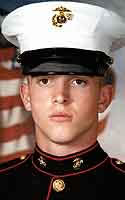 I first found Adam Fales on the internet. It was one of those commonplace activities, typing your own name into Google and seeing if you show up. But instead he did. It was a website made by Military Times, “The Fallen”: “Marine Cpl. Adam R. Fales / Died December 16, 2005 Serving During Operation Iraqi Freedom.” When I was younger, around eleven, I never clicked through, thinking merely how sad it was, how strange it was to share his name. Him dead; me alive.
I first found Adam Fales on the internet. It was one of those commonplace activities, typing your own name into Google and seeing if you show up. But instead he did. It was a website made by Military Times, “The Fallen”: “Marine Cpl. Adam R. Fales / Died December 16, 2005 Serving During Operation Iraqi Freedom.” When I was younger, around eleven, I never clicked through, thinking merely how sad it was, how strange it was to share his name. Him dead; me alive.
Now, I think about the strangeness of that phrase “The Fallen” and its closeness to our last names “The Fales.” I had originally written off his story as one that we’ve all heard before—a young man fights for his country and dies, heroically or not. The military’s purpose is death, so I figured I knew what his fate was, what perhaps could one day could have been mine, had I grown up with different values and political commitments.
But googling him, googling me again, I learned that his story was slightly different, slightly more particular, but maybe still not unsurprising. At the age of twenty-one, Adam R. Fales died of a “non-hostile gunshot wound” while asleep in his barracks in Fallujah, Iraq. Early news reports, probably the only available when I first found him, left ambiguous how such a non-hostile gunshot wound could have occurred and could have been accidental, especially when he should have died a different way, the way we expect—from a hostile, non-accidental gunshot wound—especially when that shot, per his family “was fired to his head while he slept.”
What is it about the military, especially as we experience it through the brutality of obituaries on the internet, that leads us to find someone dying by accident in his sleep more surprising than all the accumulated violence of a war, of the fact that this twenty-one-year old American man was in Iraq in the first place? If he had died any other way, there would have been something fated about his death. “He dreamed of going into the military ever since he was a little boy,” his mother told The Cullman Times. “He was always drawing pictures of battles and war. He also wanted to be a history teacher.” These are things that boys do, his mother seems to say; they draw pictures of the battles they will then fight, and then they will teach about them. But to die in your sleep? This seems unacceptable, surprising, perverse, maybe even unfair. Indeed, it is such a death that would lead his mother to say, “The Marines is supposed to be a big brotherhood. I support President Bush all the way, but I’m starting to lose some faith in the Marines.” She goes on, lingering in the uncertainty of a son who died incorrectly: “The Marines can’t take care of their own.”
For a long time, I didn’t care about Adam Fales either. He was him; I was me, both of us linked by the strange thread of a name. I wonder if he too was bullied for his last name and its homonymic relation to the word “fails.” What his mother is saying, I think, is that the Marines failed Adam Fales. They didn’t make good on their end of the bargain: to either bring him home or let him die in battle. Perhaps, rather than “The Fallen,” that site, regardless of whether each soldier died by hostile or non-hostile gunshot wounds, might be better named The Failen, The Falen. All these words can sound the same. But for a long time, though, I still didn’t care about Adam Fales—Did I fail him? For years, when I would google him, when I would google me, he was the top search result. I would occasionally tell friends, oh yeah, I share a name with a marine who died, embarrassed, maybe, by this coincidence.
But since then, I have pushed him below the top spot. I’m the Google search result. Maybe this was the evolving nature of the internet. Since 2005, everyone began producing more content online, so it would make sense that any of the Adam Faleses still alive—there are others with less tragic stories—would now “rank” higher than Marine Cpl. Adam R. Fales. But the specific nature of my career—as a writer, editor, researcher, graduate student, and obsessive Twitter user—it feels intentional, inevitable that I would surpass the other Adam Fales’s memorial page. Or, if not, it feels like a necessary side effect of the life I chose to lead, just as his death seems, from an uncaring perspective, like a necessary side effect of the one he chose. On Google’s first page, almost all the results are about me, with one about him. Maybe, if I publish this essay online, it will further push him down into the internet’s wreckage of memory. Maybe this contest is something we couldn’t avoid.
I don’t have much investment in honoring members of the military as members of the military. But I do wish Adam Fales’s life had turned out differently, one way or another. As a small exchange, here is a record of some of the links I would return to when I went to Google looking for myself:
- https://apnews.com/article/b7d7d97371b264a25180c81e36262978
- https://www.wsfa.com/story/4271104/alabama-soldier-killed-in-iraq/
- https://thefallen.militarytimes.com/marine-cpl-adam-r-fales/1424968
- http://apps.washingtonpost.com/national/fallen/
- https://myspace.com/cplfales
- https://www.stltoday.com/news/local/families-agonize-at-pace-of-inquiries/article_8ea11e66-b670-11e1-a800-0019bb30f31a.html